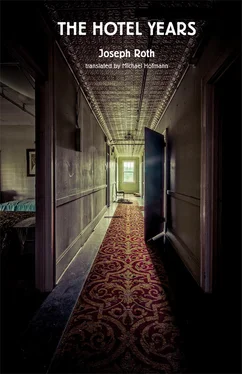Joseph Roth - The Hotel Years
Здесь есть возможность читать онлайн «Joseph Roth - The Hotel Years» весь текст электронной книги совершенно бесплатно (целиком полную версию без сокращений). В некоторых случаях можно слушать аудио, скачать через торрент в формате fb2 и присутствует краткое содержание. Год выпуска: 2015, Издательство: New Directions, Жанр: Прочая документальная литература, Прочая документальная литература, Культурология, Классическая проза, на английском языке. Описание произведения, (предисловие) а так же отзывы посетителей доступны на портале библиотеки ЛибКат.
- Название:The Hotel Years
- Автор:
- Издательство:New Directions
- Жанр:
- Год:2015
- ISBN:нет данных
- Рейтинг книги:3 / 5. Голосов: 1
-
Избранное:Добавить в избранное
- Отзывы:
-
Ваша оценка:
- 60
- 1
- 2
- 3
- 4
- 5
The Hotel Years: краткое содержание, описание и аннотация
Предлагаем к чтению аннотацию, описание, краткое содержание или предисловие (зависит от того, что написал сам автор книги «The Hotel Years»). Если вы не нашли необходимую информацию о книге — напишите в комментариях, мы постараемся отыскать её.
Frankfurter Zeitung
The Hotel Years — читать онлайн бесплатно полную книгу (весь текст) целиком
Ниже представлен текст книги, разбитый по страницам. Система сохранения места последней прочитанной страницы, позволяет с удобством читать онлайн бесплатно книгу «The Hotel Years», без необходимости каждый раз заново искать на чём Вы остановились. Поставьте закладку, и сможете в любой момент перейти на страницу, на которой закончили чтение.
Интервал:
Закладка:
He saw through hope, came to like doubt, but didn’t lose his faith. It’s not possible to lose faith: after all, it’s faith in God. Scepticism doesn’t hurt such faith: on the contrary, it accompanies it, sometimes even supports it. The unreliability of the world is a consequence of its inadequacy. You don’t oppose its pressure, its mood, its despotism, by open revolt, which can have no other outcome than catastrophic inadequacy, in other words: disorder, the greatest of all dangers to a human, but by a retreat into the depth, into the cave of the self. An association, impossible to dismiss, with the image of the gloomy Spanish monarch burying himself alive.** He doesn’t live off to the side, but in the depths. From below he sees more accurately, with a juster bitterness and a moral bitterness, the facility, the poverty of the high-ups, and more clearly the summit of heaven; by day the stars that populate it (even by day). The dead on all sides are nearer to him than the living can be above him. He hears their breathing, the silent sleep of the time-conquerors. They have conquered this era that is so antagonistic and so wrong. It is made up of darkness and a false dawn, hailed by clueless, optimistic, noble, revolutionary bowler hats, feared by bitter men of our sort, who are not colour blind and understand exactly how much human blood is needed to brew that “dawn’s fiery glow”. It is soaked full of the blood of the great revolution, of the wars of Napoleon, when for the first time the cry rang out: “Nations, awaken!” The response of our dour species is: “From humanity through nationality to bestiality.”
Oh, those times! The hierarchical institutions are still intact, but the men in charge of them are slothful, thoughtless, unprincipled. They embody the randomness and disorder they have been called in to oppose. They are not called, they are hired. They have the perplexing ability — the curse, more — of oppressing and retreating at one and the same time. The astringency of the ancestors and forefathers, put to the service of an implacable idea, is as different from the facile, illegitimate desire to press, the tyranny of the ruler, as dark is from black. Anarchy wears the mask of legitimacy. Meanwhile, a second anarchy, following on the heels of the first, makes ready to fight it. Lonely and timorous on the surface, protected in the depths. Charles V went to the grave alive; he felt the end was nigh, he too had no confederates.
VI
The end of the great but perceptibly shrinking empire still has one noble aspect, for all its inner cracks, flaws, pettinesses and rottennesses. A noble death. The victorious troops have something of the classic élan of Lipizzaner greys, the courtliest beasts in Europe, who have the symbolic nobility of heraldic animals. Austrian troops go to battle in snow-white tunics. Their victories are the classic successes of an outlived tradition. Their defeats carry symbolic weight. It’s the last hurrah of the old knightliness, losing out to plebeian technology; the unprotected advance of massed ranks against small, mobile, camouflaged units in broken field; the highly visible snow white, a noble target, against a blue that was invisible in fog (and called “Prussian blue” ever since); the cavalry charge against fortified artillery positions. It’s the end of feudalism: dying in the old armour, fighting a parvenu who is about to put on the false crown, a legal figment of an emperor. Seen from a higher angle, the Junker becomes an ignorant beneficiary of the great Revolution and the only genial arriviste of history: Napoleon.
Such is the catastrophe billowing around Grillparzer. His contemporaries — even the most significant of them — are not able to stand up to it. They are too small for such a comprehensive defeat, which confirms the decline of Charles V, and anticipates that of Karl in 1918. They take refuge in the treasury of home, in Austria, which is still capacious and various enough and has enough breath, but is now only “folklore” not “world”. Its orientation has changed, too: now it is Zagreb, Sarajevo, Belgrade, Tehran, Constantinople; no more towards Ghent, Bruges, Antwerp, Amsterdam, Cologne, Frankfurt, Milan, Rome, Hanover — and the fraternal enemy Berlin. The great and important in Austria acquire the peripheral character of specialities — dialect dyes them all, even the cosmopolitan Viennese, not just the provincial “folk poets” and “local characters”. Only Grillparzer kept the world in view, because he was the only one who suffered the pain of the lost, great, dry world. But Calderon and the Spanish antecedents of the Habsburgs became ever more remote, that is: his moral and intellectual origins are still less present than his material home, Switzerland. Twenty years ago the past was still there, instinct with life. Now it’s shrouded in dimness and fog. Grillparzer alone remains, a monument, buried alive, a living monument, already crumbling. His face is like weathered stone, yellow-hued, as though there was something like stone parchment. His body, too, lean, knotty and stooped, is reminiscent of wood, root, rock. His statue is less stony than he is. His heart shines in his large eyes, loyal grey mirrors to a sunken world, large, bright lights that listened to the future, and picked up the terror of the final end. When he shut them for ever, not prematurely, not at the right moment, if anything too late, because death can sometimes be as cruel as life — Charon delayed — people only knew that a “classic”, one of the “greats”, “a Burgtheater dramatist”, an Austrian pendant to the Académie Française-member, a retired senior civil servant, had gone on. And one knows still less today than then about how widely spanned his life’s arc was, all the way from Alcázar to Königgrätz; from grandezza and ceremonial to vulgarity and the Prussians; from the Habsburgs to the Hohenzollerns: from humanity through nationality to bestiality.
Austria has no Pantheon, only its cemeteries and a Kapuzinergruft, and rightly so. They are all under the sward: Beethoven, Bruckner, Stifter, Raimund, Nestroy, Grillparzer. To represent Austria means to be misunderstood and maltreated in your lifetime; unappreciated after your death; and periodically, by the agency of anniversary celebrations, to be returned to obscurity.
Das Neue Tage-Buch (Paris), 4 December 1937
*Franz Seraphicus Grillparzer (1791–1872), Austrian dramatist and moralist.
† Kahlenberg: a hill outside Vienna, affording celebrated views of the city.
‡ Sadová, or Königgrätz: the decisive battle in 1866 of the Austro — Prussian War.
§ Lissa: sea-battle in the Adriatic in the same war.
∥ Heuriger: newly made white wine, drunk and celebrated in the hills around Vienna.
¶ Die Ahnfrau (The Ancestress) , Grillparzer’s play of 1817.
** Burying himself alive: Charles V, the Holy Roman Emperor, (1500–1558), who retired to the monastery of St. Yuste where he died.
62. The Bitter Bread
Day breaks, and the poor man wishes he could prolong the night. It is December, admittedly, so the day begins late, but it is still too early for him. Mornings are bad, but with the passage of time the poor man has learned that they need to be withstood, because the day is waiting. Not all days are as bad as their advance guard, the morning. Some, a rare few, have been surprisingly favourable, others, most, have been decidedly bad. But you can’t judge the day from the morning.
It is a tiny fourth-floor hotel room, with scarlet wallpaper, patterned with yellow sunflowers. A nearby church clock strikes eight. There is a rushing in the pipes, because a tenant on the first or second floor is running a bath. Now the poor man taxes the running water himself. For two weeks the same towel has been hanging over the brass rail. The towel is soiled by the dirt of the past days, the bearable, the ordinary, and the decidedly bad days. The bedding too is four weeks old. But in the morning you don’t absolutely have to look at it, and at night you can’t see it, because the overhead light fixture lights only the middle of the ceiling, it is there mostly for the benefit of flies. The spiders lurk in dark corners, behind thick grey webs of their own making, probably waiting for the poor man to switch off the light and feel his way, barefooted from the door to bed. Then the flies will be trapped in the webs, and will be rolled up, sucked dry and eaten. Because there is no creature that does not rob, steal, kill, eat and live. Only the poor man needs money, otherwise he cannot live.
Читать дальшеИнтервал:
Закладка:
Похожие книги на «The Hotel Years»
Представляем Вашему вниманию похожие книги на «The Hotel Years» списком для выбора. Мы отобрали схожую по названию и смыслу литературу в надежде предоставить читателям больше вариантов отыскать новые, интересные, ещё непрочитанные произведения.
Обсуждение, отзывы о книге «The Hotel Years» и просто собственные мнения читателей. Оставьте ваши комментарии, напишите, что Вы думаете о произведении, его смысле или главных героях. Укажите что конкретно понравилось, а что нет, и почему Вы так считаете.












